How To Master Time Management as a New Special Education Teacher: Strategies for Success
Mastering Time Management as a New Special Education Teacher
As a new special education teacher, you're likely feeling the weight of an ever-growing to-do list. With lesson planning, data collection, IEP meetings, and countless other tasks, it can often feel like there simply aren’t enough hours in the day. However, there’s good news—this blog will provide you with practical time-management strategies designed to help you regain control over your schedule and enhance your teaching effectiveness.
The Importance of Time Management
Time management isn’t just about keeping track of your tasks; it’s about creating a sustainable workflow that allows you to focus on what truly matters: your students. Effective time management can lead to increased productivity, reduced stress, and a better work-life balance. Moreover, implementing strategic time-management skills early in your career sets a solid foundation for your future as an educator.
Identifying Priorities
One of the first steps in mastering time management is learning to identify and prioritize your tasks. Start each week by listing out everything you need to accomplish, then categorize these tasks into three groups:
- Critical Tasks: These are non-negotiable items that must be completed immediately, such as IEP meetings or lesson planning for the next day.
- Important Tasks: While these are not urgent, they still contribute significantly to your overall goals, like long-term planning and data analysis for student progress.
- Optional Tasks: These are low-priority items that can be finished as time allows, like organizing your classroom materials or planning future activities.
By organizing your tasks this way, you'll empower yourself to focus on what requires immediate attention and avoid becoming overwhelmed. But remember, prioritization is just one facet of effective time management—it requires a combination of organization and strategic planning.
Leveraging Technology for Efficiency
In today's fast-paced educational landscape, technology can be your best ally. Various digital tools can streamline lesson planning, automate data collection, and simplify communication with parents and colleagues. AI-driven systems can assist in various areas such as progress tracking, making data analysis quicker and more accurate.
Imagine a scenario where you input data about your students' performance and the software generates customized reports. This not only saves you valuable time but also enhances your ability to cater to each student's unique needs. With technology doing the heavy lifting, you can allocate more energy to direct engagement with your students.
Delegation and Collaboration
Teaching doesn’t have to be a solitary endeavor. Collaborate with colleagues, share resources, and delegate tasks when possible. Building relationships with fellow educators allows for the exchange of ideas and strategies, thus enhancing your effectiveness. Moreover, seeking support can ease your workload significantly, allowing you to focus on your primary responsibilities.
"Time saved in collaboration can lead to innovative solutions and shared successes."
Investing in AI Training for Your Educators
As the educational sector continues to evolve, it's crucial to equip yourself and your colleagues with the skills needed to leverage technology efficiently. Investing in AI training can redefine how your organization approaches time management and productivity. By understanding how AI can assist in data analysis and administrative tasks, teachers can redirect their focus toward actual teaching and student engagement. Training your entire workforce not only empowers educators but also fosters a culture of continuous improvement within the school.
Building a Sustainable Work-Life Balance
Finally, never underestimate the power of maintaining a healthy work-life balance. Burnout is a genuine risk for educators, particularly new teachers juggling numerous responsibilities. Schedule regular breaks during your workday, utilize your time wisely, and set clear boundaries to separate your professional and personal life. Embracing self-care will nurture your passion for teaching, ensuring that you remain effective and fulfilled in your role.
Conclusion
The journey of a new special education teacher is challenging but incredibly rewarding. By embracing effective time management strategies, leveraging technology, collaborating with peers, and investing in training, you’ll find that not only can you thrive professionally, but you’ll also enjoy a more balanced and fulfilling life. Remember, every task completed and every moment saved brings you one step closer to making a meaningful impact on your students’ lives.



